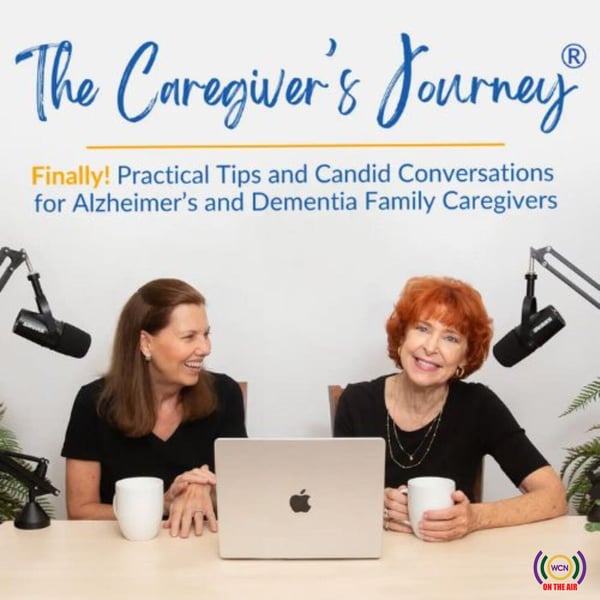Memory Loss: Four Essential Tips / Alzheimer’s and Other Dementias
The Caregiver's Journey
Sue Ryan and Nancy Treaster
5 • 1.9K Ratings
🗓️ 30 July 2024
⏱️ 30 minutes
🧾️ Download transcript
Summary
Does it feel like a punch in the gut every time you realize something new your loved one has forgotten? As caregivers for our husbands, parents, and other loved ones with Alzheimer’s disease and other types of dementia, we've learned that memory loss in the early stages is a challenging journey. In the beginning (the early season of the diagnosis), our primary goal is to help our care receivers maintain as much dignity and independence as possible while providing support behind the scenes. We are Sue Ryan and Nancy Treaster, and through our experiences, we have four main tips that we'd like to share with you.
Show Notes
Takeaways
In this episode, we're talking about memory loss “in the beginning”. When we say “In the beginning” we mean when you're mostly helping your care receiver manage things (often behind the scenes), while also helping them maintain their independence.
We offer four tips to help you.
Tip 1: Figure Out What Information They're Struggling to Remember
One of the most effective ways to support your loved one is by identifying what information they're having trouble remembering. This involves careful observation and adapting your approach to help them maintain their dignity and independence.
Tip 2: Understand and Help with What They Can No Longer Do
As the condition progresses, it’s important to adapt tasks your loved one can no longer manage independently.
Tip 3: Get Other People Involved, As Appropriate
Sharing the diagnosis with others can be a sensitive topic, but it's often crucial for both the caregiver and the care receiver.
Tip 4: Watch Out for UTIs - They Can Muddle the Whole Situation
Urinary Tract Infections (UTIs) can significantly impact cognitive function and behavior in people with dementia and there can often be no symptoms except a sudden cognitive decline.
At the beginning it’s hard to get your head around what is happening. You will get through this phase, and your confidence will grow as you learn to handle each new situation.
Related episodes
3. Communication - in the Beginning: Four Essential Tips / Alzheimer’s and Other Dementias / Practical Tips and Candid Conversations
Rate, subscribe and share your tips on social media!
Thanks for listening! If you enjoyed this episode, please leave a review and subscribe on your favorite podcast platform.
Please click here to review, follow or subscribe to our podcast.
If you don’t see your preferred platform click on Podchaser and click at the bottom “Write my review”
- You can log in with Twitter, Facebook or Google
- On the right you’ll see a box with “Follow”, “Rate and Review” and “Share”
Connect with us and share your tips:
- Website: https://www.thecaregiversjourney.com
- Instagram: https://www.instagram.com/thecaregiversjourney/
- Facebook: https://www.facebook.com/TheCaregiversJourneys/
- Email: [email protected], [email protected]
Keywords
Alzheimers, dementia, caregiver, caregiving, Alzheimers care, dementia care, memory care, best dementia podcast, best alzheirmers podcast, best caregiver podcast, best caregiving podcast, best caregiver podcast, dementia caregiver podcast, dementia podcast, alzheimers podcast, caregiver podcast, senior caregiver podcast, dementia caregiver tips, frontotemporal dementia, dementia caregiver tips, how to deal with dementia as a caregiver, information on dementia for caregivers, how to be a caregiver for someone with dementia, Sue Ryan, Nancy Treaster, Susan J Ryan
Transcript
Click on a timestamp to play from that location
| 0:00.0 | This is the Whole Care Network, |
| 0:02.5 | helping you tell your story one podcast at a time. |
| 0:16.3 | Content presented in the following podcast is for information purposes only. |
| 0:22.7 | Views and opinions expressed in this podcast are solely those of the host and guests |
| 0:28.0 | and may not represent the views and opinions of the Whole Care Network. |
| 0:33.1 | Always consult with your physician for any medical advice. |
| 0:36.8 | And always consult with your attorney for any legal advice. And always consult with your attorney for any legal advice. |
| 0:40.5 | And thank you for listening to the Whole Care Network. |
| 0:48.6 | In this episode, we're talking about memory loss and memory loss in the beginning. |
| 0:58.3 | In the beginning, it's really when you're starting to help your care receiver, but you're |
| 1:04.3 | also helping them maintain their independence. |
| 1:07.2 | Sometimes you're helping really behind the scenes. |
| 1:09.6 | We've got four main tips. The first one is to |
| 1:13.2 | figure out what your care receiver is struggling to remember. The second one is to understand |
| 1:20.1 | and help with what they can no longer do. The third tip is about getting other people involved, |
| 1:26.7 | as you deem appropriate. |
| 1:28.3 | And the fourth one is to watch out for UTIs. |
| 1:30.9 | They can muddle up the whole situation. |
| 1:33.0 | Well, they sure do. |
| 1:34.8 | But let's start with a candid conversation around memory loss. |
| 1:39.3 | And memory loss in the beginning. |
| 1:41.8 | Welcome. |
... |
Please login to see the full transcript.
Disclaimer: The podcast and artwork embedded on this page are from Sue Ryan and Nancy Treaster, and are the property of its owner and not affiliated with or endorsed by Tapesearch.
Generated transcripts are the property of Sue Ryan and Nancy Treaster and are distributed freely under the Fair Use doctrine. Transcripts generated by Tapesearch are not guaranteed to be accurate.
Copyright © Tapesearch 2025.

